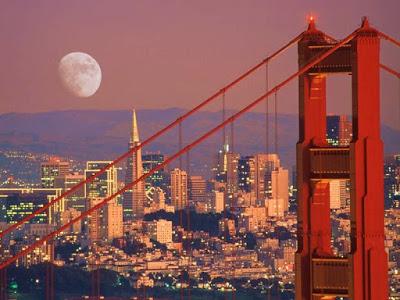
The 2016 film noir season was officially launched with San Francisco's Noir City XIV, January 22 - 31, at the city's Castro Theatre. The 10-day festival, presented by the Film Noir Foundation, is traditionally the first in a series of Noir City events to follow in Hollywood, Austin, Portland (Oregon), Chicago, Washington, D.C., and Kansas City.
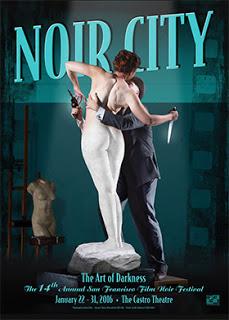 This year's festival theme, "The Art of Darkness," offered a selection of films "in which artists are at the core of every story." Thus, many films on the program were more noir-tinged than they were straight-up film noir, and included Alfred Hitchcock's Rear Window (1954), The Picture of Dorian Gray (1945), based on the Oscar Wilde novel, multiple Oscar winner The Bad and the Beautiful (1952), the Powell/Pressburger masterpiece The Red Shoes (1948) and Michelangelo Antonioni's 1966 art house sensation Blow-Up. Asserted Film Noir Foundation founder and festival host Eddie Muller, "I offer no apologies to the [film noir] purists."
This year's festival theme, "The Art of Darkness," offered a selection of films "in which artists are at the core of every story." Thus, many films on the program were more noir-tinged than they were straight-up film noir, and included Alfred Hitchcock's Rear Window (1954), The Picture of Dorian Gray (1945), based on the Oscar Wilde novel, multiple Oscar winner The Bad and the Beautiful (1952), the Powell/Pressburger masterpiece The Red Shoes (1948) and Michelangelo Antonioni's 1966 art house sensation Blow-Up. Asserted Film Noir Foundation founder and festival host Eddie Muller, "I offer no apologies to the [film noir] purists."I'm no purist, but if I'm going to a film noir festival, I want to see film noir. For me, the two most appealing films on the schedule were Fritz Lang's Scarlet Street (1945) and Nicholas Ray's In a Lonely Place (1950), two genre classics. In the end, we went with In a Lonely Place mostly because finding parking in San Francisco's busy Castro district would be less challenging on a Monday night than a Friday, when Scarlet Street would be shown.
Parking turned out to be no problem at all thanks to perfect timing and/or amazing luck, so we arrived at the theater well ahead of show time; a very good thing since the 1,400-seat venue would soon be packed. Meanwhile, an organist played the the Castro's new, custom-designed replacement for its legendary Wurlitzer and complimentary gin-on-the-rocks was being served up on the mezzanine level. Soon enough Eddie Muller took the stage to introduce In a Lonely Place, his "favorite Hollywood film of all-time."
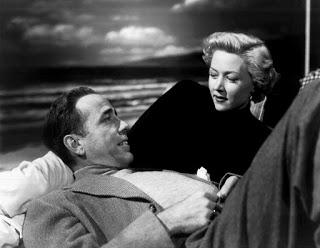
Bogart and Grahame, In a Lonely Place
In a Lonely Place was adapted from Dorothy B. Hughes's superb 1947 crime novel about a serial killer on the loose in post-World War II Los Angeles. The film's final screenplay by Andrew Solt, with much input from Nick Ray and producer Robert Lord, transformed Hughes's edgy psychological thriller into the bleak tale of a near-has-been Hollywood screenwriter (Humphrey Bogart) who may or may not have committed a murder. Complicating his predicament is his new neighbor, a dishy blonde (Gloria Grahame) who kindly provides him with an alibi and an intense romantic entanglement. Their tortured love affair becomes central to the narrative, is the film's most compelling feature and, according to Nick Ray, a personal reflection on his own relationship with his soon-to-be ex-wife, Gloria Grahame.Gloria Grahame. Oscar winner (The Bad and the Beautiful/1952) and noir goddess (see also The Big Heat/1953), her screen presence is a heady mix of sexuality and fragility. She brings such emotional authenticity to her best performances that they often, and notably in In a Lonely Place, stand out for their modernity in contrast to the more traditional/theatrical acting style of her co-stars. In a Lonely Place is acclaimed for Ray's direction, for its gritty depiction of Hollywood insiders and for the maturity of its portrayal of human relationships, but there would be so much less to admire without the dazzling Grahame.
~
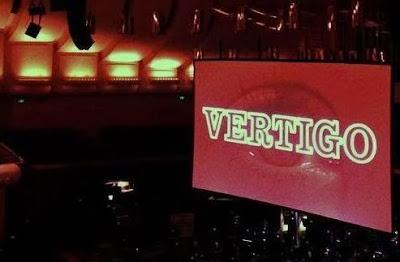
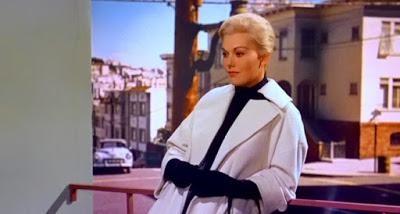
Kim Novak in Vertigo

